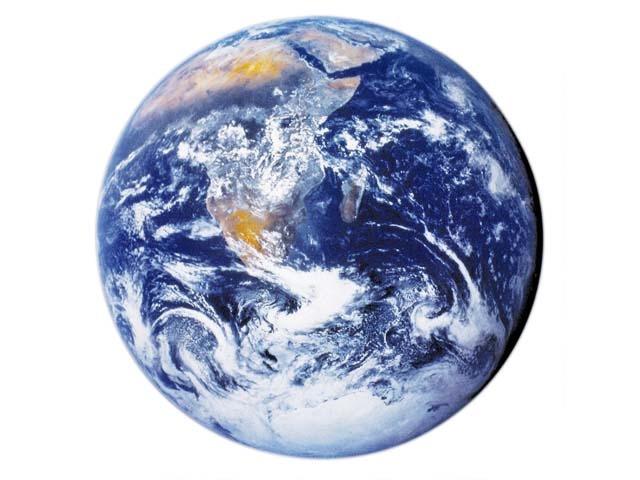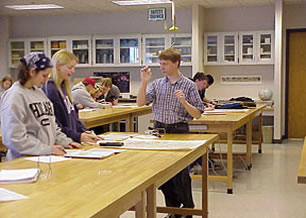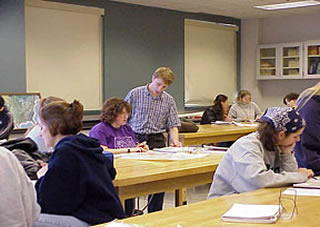Topics:
Earth Science
 The Earth Science Department offers a variety of courses including Physical Geology, Environmental Geology, Stellar Astronomy, Solar System Astronomy, and Earth Systems Science (for non-majors). All Earth Science courses include both lecture and lab experience for the best hands-on training. A list of courses with catalog descriptions follows.
The Earth Science Department offers a variety of courses including Physical Geology, Environmental Geology, Stellar Astronomy, Solar System Astronomy, and Earth Systems Science (for non-majors). All Earth Science courses include both lecture and lab experience for the best hands-on training. A list of courses with catalog descriptions follows.
The instructors in the Earth Science Department are enthusiastic and ready to teach the students principles and procedures using state-of-the-art equipment and technology. They share how the student’s education will be necessary as they move into the workforce. A very useful tool available to the department is the observatory located behind the campus. The students get hands-on experience using a Newtonian telescope which reinforces the classroom information.
Through completion of their academic path in Earth Science, students will develop the ability to:
- Demonstrate correct understanding of geoscience concepts.
- Identify and classify specimens using data and observations.
- Demonstrate skills in field and/or laboratory setting by making precise accurate measurements of earth science variables.
- Use data to solve earth science problems by correctly interpreting earth science data sets.
- Apply the concepts and theories learned in class to issues facing them in society and in personal life.
Earth Science Course Offerings
ESCI 1004 Earthquakes and Volcanoes
This course examines the causes and effects of earthquakes and volcanic activity. It also covers the impacts of earthquakes and volcanic eruptions, including secondary effects such as landslides, mudflows, and tsunamis; climatic effects; energy/mineral resources; and social disruption. Additionally, the mitigation of effects of natural disasters will be included.
ESCI 1101 Earth Systems Science
This course explores our planet and how it works. It surveys basic concepts of shifting tectonic plates, deep geologic time, earthquakes, volcanic eruptions and the nature of rocks and minerals. Laboratory exercises will introduce students to the methods of geoscience and will supplement the lectures. Non-science majors will benefit from this course.
 ESCI 1114 Physical Geology
ESCI 1114 Physical Geology
This is a physical geology lab course with an emphasis on Minnesota. The focus is on the processes that shaped our state and our world. The course explores the connections between the rocks and waters and the people and the economy. We explore the rock cycle (minerals, rocks, volcanic activity, weathering and soils) using local examples. We also examine the geologic history and fossils of Minnesota as we investigate deep time. Students will strive to understand the forces that shaped our state such as glaciers, rivers, lakes, groundwater, mass movement and earthquakes. Both science and non-science majors will benefit from this course.
ESCI 1115 Historical Geology
This course covers the history and evolution of the Earth and the life on Earth. Major scientific theories covered include the Theory of Plate Tectonics and the Theory of Evolution by means of Natural Selection. Students will learn how the moving plates have changed the geography of the Earth throughout geologic time. They will also learn how life has evolved and changed over time from the earliest beginnings through dinosaurs and mammals up to modern times and the origin of our human species. Other topics include Geologic time, relative and absolute dating and rocks and minerals with emphasis on sedimentary rocks. Lab experiences will feature hands on experiences and will apply the scientific method to questions of Earth’s history.
ESCI 1124 Solar System Astronomy
This course is a survey of the solar system. It includes study of the Earth and Moon, the planets and their satellites as well as asteroids, meteors and comets. Study includes the history of astronomy from ancient times leading up to our modern view of the sun and planets. Topics include light and telescopes, planetary surfaces and atmospheres and the origin of planetary systems. Students will also be introduced to striking beauty of our solar system as revealed through images and direct experience through the telescope. Lab work is supplemented by astronomical observations at the RCTC observatory.

ESCI 1134 Stellar Astronomy
This course is an introduction to stellar astronomy for the non-science major. The course covers topics that include light and spectra, the sun, stars, galaxies, supernovae, black holes and the Big Bang. In addition, students will be introduced to the stunning beauty of the universe as revealed in images, written works and direct experience through the telescope. Laboratory exercises introduce students to the methods astronomers use to study the universe. Lab work is supplemented by astronomical observing sessions at the RCTC Observatory. NOTE: ESCI 1134 and PHYS 1134 are cross-listed. Students may take one or the other for credit, but will not receive credit for both.
ESCI 1144 Introduction to Environmental Geology
This course examines the relationship between geology and short-term human concerns (periods of no more than a few hundred years). Topics include earthquake hazards, volcanoes, flooding, landslides/mass wasting, groundwater and surface water problems, radioactive waste disposal, energy and mineral resources and radon. Environmental issues and effects on society are a major focus.
ESCI 1154 Introduction to Meteorology
This course will introduce students to our atmosphere and how variables in the atmosphere affect our daily and seasonal weather patterns. Students will gain an understanding of how weather occurs and how the atmosphere affects us individually and as a society. Other topics include tornadoes, hurricanes, air pollution and climate change. This course contains a lab-like component.
Earth Science Instructor
For instructor’s credentials, class schedules, and class syllabi, please click the instructor’s name.
Current Common Course Outlines for these courses can be found on the Course Schedule or Catalog Course Descriptions.
